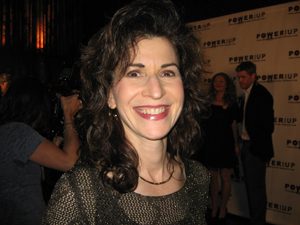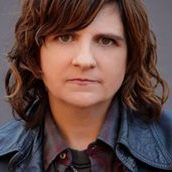
Dawdling around the bar, speculating about what I could be drinking if I weren’t on the job, I notice a woman across the room who seems out of place.
Attractive and sophisticated, she has an air about her that somehow sets her apart from the Hollywood movers and schmoozers networking around her.
My keen investigator eye tells me that she’s either shy or doesn’t know anyone. Since I’m drawn to strong silent types and killing time while waiting for the ceremony portion of the ninth annual Power Premiere to begin, I approach.
She’s musician Sharon Isbin, a Grammy-winning classical guitarist set to perform at the White House just a few days later and then with Orange County’s elite Pacific Symphony this month.
I ask, “Girl, what the hell are you doing here?” OK, not exactly in those words, but it turns out she was one of the evening’s honorees, an out lesbian named one of Power Up’s 10 Most Amazing Gay Women/Men in Showbiz for 2009. Luckily she’s a good sport as well. She came all the way from New York to accept the honour, and no, she doesn’t know anyone in the room.
“I’ve been aware of Power Up for a long time,” she says. “[Showtime’s] Gwen Marcus is a good friend, she was a recipient in the past. She’s a real dynamo in the New York scene.”
Because my knowledge of classical music is shaky (I know that the Pacific Symphony plays in a shiny new, world-class performing arts venue and I attend Hollywood Bowl on Movie Music nights), I steer the conversation to familiar ground. Music does, after all, play a major role in setting the right tone on screens big and small.
“Every once in awhile my world intersects the film world, and it’s been really fun when it has,” she says. “The first time I was asked to be a guest star on The L Word playing myself the second season. And the next time I was the soloist in the score soundtrack of Martin Scorcese’s film The Departed.
Geez, not just any film, a Scorcese picture. And this was an intense, critically acclaimed movie starring Leonardo DiCaprio, Matt Damon and Jack Nicholson that won Academy Awards for best picture, director, editor and adapted screenplay in 2007.
“Do you remember the scene, Billy’s therapy session?” she asks. “There’s a long solo guitar accompanied by string orchestra; that’s me.
“What’s fascinating is the music really fleshes out a part of his character you don’t see in images, the music is very sensuous, ethereal, and the music shows his sensitive side.”
Howard Shore, the composer, selected Isbin to perform the solo for what became an Oscar-nominated score. I stuck around to hear her sensuous strumming later in the evening. No doubt, she has a rare talent. The way her fingers fly over the strings is mesmerizing, and a fete my sausage-link phalanges could never hope to emulate.
I wonder—aloud of course—if being out among the conservative elite that tends to crowd the concert halls here has ever presented a problem.
“It didn’t have any impact on what I do,” she says, assuredly. “It’s like nobody really cares, it’s such a boring old story in the music world. It’s just not interesting. In the theatre world and in Hollywood, it still just sends shivers down people’s spines, the thought of having to be out. But in my world, it’s just not interesting, which is good.”
Yes, that is good. She’s a talented woman who’s respected for her professional accomplishments, and that’s what should matter.


